
DISCOURSE PROCESSES
Scope & Guideline
Pioneering Research in Communication and Pragmatics
Introduction
Aims and Scopes
- Cognitive Processes in Discourse:
Research that delves into how cognitive mechanisms such as memory, inference-making, and attention influence the understanding and production of discourse. - Linguistic Analysis of Discourse:
Studies focusing on the linguistic features that affect discourse processing, including syntax, semantics, and pragmatics. - Social and Contextual Influences:
Investigations into how social factors and contextual elements shape discourse comprehension and production, including the role of gestures and multimodal communication. - Educational Applications:
Research aimed at improving educational practices through the understanding of discourse processes, including the use of technology and instructional strategies. - Multimodal and Cross-Modal Discourse:
Exploration of how different modes of communication (e.g., visual, auditory) interact and influence understanding in discourse.
Trending and Emerging
- Digital and Multimedia Discourse:
An increasing focus on how digital communication and multimedia contexts influence discourse processes, reflecting the growing relevance of technology in everyday communication. - Interdisciplinary Approaches:
The journal is seeing a rise in interdisciplinary research that incorporates insights from cognitive science, neuroscience, and education, fostering a more holistic understanding of discourse. - Emotional and Social Dimensions:
There is a notable trend towards exploring the emotional and social dimensions of discourse, including how emotions affect comprehension and the role of social interactions in discourse processing. - Metaphor and Figurative Language Research:
Emerging interest in the processing of metaphor and figurative language, particularly in how these elements impact comprehension and communication in various contexts. - Cognitive Load and Working Memory:
A growing emphasis on the roles of cognitive load and working memory in discourse comprehension, highlighting the cognitive demands of processing complex information.
Declining or Waning
- Traditional Linguistic Features:
While linguistic analysis remains important, there seems to be a decline in papers focusing solely on traditional linguistic features without integrating cognitive or social perspectives. - Static Models of Comprehension:
Research that relies on static models of comprehension processes is becoming less common, as the field increasingly favors dynamic, interactive models that consider real-time processing. - Focus on Individual Differences:
There has been a noticeable decrease in studies that exclusively focus on individual differences in discourse processing, as more recent works emphasize contextual and situational factors instead. - Narrowly Defined Text Types:
Papers centered around specific text types (e.g., only focusing on narrative texts) have diminished, with a broader range of discourse forms being explored instead. - Overemphasis on Traditional Educational Contexts:
Research specifically targeting traditional educational settings is declining, as the journal shifts towards more innovative and varied contexts for discourse analysis.
Similar Journals
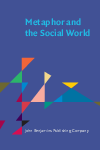
Metaphor and the Social World
Unveiling the Language of Social ConstructsMetaphor and the Social World is a premier journal in the field of linguistics and language studies, published by JOHN BENJAMINS PUBLISHING CO. With its ISSN 2210-4070 and E-ISSN 2210-4097, this journal has carved a niche for itself since its inception in 2011, enjoying a strong reputation and an anticipated convergence period extending to 2024. Recognized in the Q1 quartile for linguistics, it ranks impressively within the Scopus Arts and Humanities category (#172/1088), placing it in the 84th percentile, and also holds a notable rank in the social sciences (#201/1167, 82nd percentile). The journal explores the intricate relationships between metaphorical language and social constructs, contributing valuable insights to both theoretical linguistics and practical applications. Its commitment to fostering scholarly discourse makes it an essential resource for researchers, professionals, and students alike, underlining the significance of metaphor in shaping our understanding of social interaction and cultural dynamics.

DEUTSCHE SPRACHE
Pioneering Insights into the German Linguistic LandscapeDEUTSCHE SPRACHE, published by Erich Schmidt Verlag, is a pivotal journal dedicated to the intricate study of the German language. With its ISSN 0340-9341 and E-ISSN 1866-5233, this publication serves as a vital resource for linguists, educators, and language enthusiasts alike. Spanning diverse topics within the fields of linguistics and language, psychology, and social sciences, the journal has earned a Q3 ranking in Linguistics and Language, alongside a Q4 ranking in both Psychology (miscellaneous) and Social Sciences (miscellaneous) as of 2023. Although the journal is not Open Access, it provides invaluable insights on the developments in German language research from its convergence years of 2002 to 2011 and 2017 to 2023. Positioned in Berlin-Tiergarten, Germany, DEUTSCHE SPRACHE continues to expand its influence and accessibility to researchers, professionals, and students keen on understanding the nuances of linguistic expression in the German language.
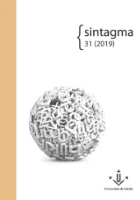
Sintagma
Pioneering Research in Linguistics and Language.Sintagma is a prominent academic journal dedicated to advancing the field of Linguistics and Language, published by the Universitat de Lleida in Spain. With an ISSN of 0214-9141 and an E-ISSN of 2013-6455, this journal has established itself as an open-access platform since 1989, thereby ensuring wide accessibility and dissemination of research. The journal's commitment to quality is reflected in its ranking within the Q4 quartile of Linguistics and Language in 2021 and a similar standing in Social Sciences and Arts and Humanities, which underscores its emerging importance in these fields despite recent challenges. Covering topics that span theoretical inquiries to applied linguistic studies, Sintagma invites researchers, professionals, and students to contribute to and engage with its evolving landscape from its unique academic perspective. With the convergence of research years from 2011 to 2018 and upcoming issues through 2024, the journal remains poised to provide insightful content that addresses the linguistic dimensions of contemporary society.

Linguistic Research
Exploring the Dynamics of Language and CommunicationLinguistic Research, published by the Kyung Hee University Institute for Study of Language & Information, stands as a prominent platform within the field of linguistics and language studies. With an ISSN of 1229-1374, this journal has gained recognition for its contributions to theoretical and empirical research since its inception in 2014. Ranked in the Q2 category of linguistics and language in 2023, it has established its presence in prestigious databases like Scopus, where it ranks #404 in Arts and Humanities and #479 in Social Sciences. The journal actively encourages scholarly discussion and innovation, providing a crucial venue for researchers, professionals, and students to disseminate their findings and engage in the evolving conversation around language. Despite not being open access, Linguistic Research is pivotal for those seeking comprehensive insights and advancements in linguistic studies, making it an essential resource for anyone passionate about the dynamics of language and communication.
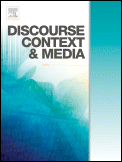
Discourse Context & Media
Engaging Scholars in the Heart of Communication DynamicsDiscourse Context & Media is a leading peer-reviewed journal published by ELSEVIER SCI LTD that focuses on the dynamic interplay between discourse, context, and media. With an ISSN of 2211-6958 and an E-ISSN of 2211-6966, this journal has established itself as a vital resource in the fields of Communication and Cultural Studies, achieving a remarkable ranking within the top quartile (Q1) as per the latest evaluations. Its Scopus ranks highlight its prominence, placing it 36th out of 1304 in Cultural Studies (97th percentile) and 71st out of 511 in Communication (86th percentile). As an open access journal based in the Netherlands, it invites researchers, professionals, and students to contribute to and engage with contemporary discussions surrounding the influence and implications of discourse in various media contexts. The journal's scope extends from 2012 to 2024, promising to reflect ongoing developments within the field and support a vibrant academic dialogue.
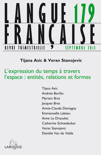
LANGUE FRANCAISE
Pioneering Research in French Language StudiesLANGUE FRANCAISE, published by LAROUSSE, stands as a premier journal in the realm of linguistics and language studies, boasting an impressive Q1 quartile rating in the 2023 Linguistics and Language category. With its international reputation anchored in France, this journal presents critical research and discussions that advance our understanding of the French language, its structures, usage, and evolution. Although not an open-access publication, LANGUE FRANCAISE is indexed with an ISSN of 0023-8368 and an E-ISSN of 1957-7982, reflecting its scholarly credibility and impact, including Scopus rankings that place it competitively in the fields of arts and humanities as well as social sciences. This journal serves as an essential resource for researchers, practitioners, and students aiming to deepen their knowledge and engage in scholarly debates that shape contemporary linguistic thought. The journal's commitment to high-quality research continues to foster an enriching academic environment and contribute to the dynamic discourse surrounding language and linguistics.

Langages
Advancing Linguistic Scholarship Since 1976Langages is a premier peer-reviewed journal in the field of linguistics, published by Armand Colin, a reputable French publisher known for its commitment to advancing academic scholarship. With an ISSN of 0458-726X and an E-ISSN of 1958-9549, this journal has been an important platform for linguistic research since its inception in 1976, and it continues to engage with contemporary linguistic debates through to 2024. The journal is ranked in the top two quartiles for linguistics and language, reflecting its significance in the academic community, with a Q2 categorization in 2023, and robust Scopus rankings within the 66th to 69th percentiles across relevant categories. Authors and researchers from around the globe contribute to its rich tapestry of scholarly articles that explore the multifaceted nature of language and its role in society, making Langages an essential resource for linguists, educators, and students alike.
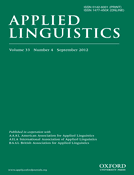
APPLIED LINGUISTICS
Championing Rigorous Research in Language AcquisitionApplied Linguistics, published by Oxford University Press, is a premier scholarly journal that has significantly contributed to the fields of linguistics and communication since its inception in 1980. With an impressive impact factor and ranked in the top quartile (Q1) in both Communication and Linguistics and Language categories, Applied Linguistics is recognized for its rigorous peer-reviewed articles that explore the intersections of language, society, and cognition. The journal enjoys a remarkable position in the Scopus rankings, placing it among the top 2% of publications in its discipline. Researchers, professionals, and students benefit from its comprehensive scope, which encompasses innovative research on language acquisition, discourse analysis, and applied linguistics methodologies. Although not an open access journal, its commitment to advancing knowledge and fostering academic discussions makes it an indispensable resource for anyone interested in the critical role of language in various contexts.
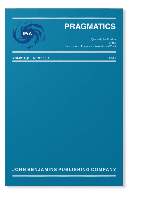
Pragmatics
Shaping the future of linguistic and philosophical discourse.Pragmatics is a premier international journal dedicated to the exploration and development of the field of pragmatics, published by John Benjamins Publishing Co. This esteemed journal, with an ISSN of 1018-2101 and E-ISSN 2406-4238, offers a vital platform for interdisciplinary research in linguistics, philosophy, and social sciences, making significant contributions to scholarly discourse since its convergence in 2005. Recognized for its high-impact research, Pragmatics boasts a prestigious Q1 ranking in both Linguistics and Language and Philosophy as of 2023, with impressive Scopus rankings that place it in the top percentiles of its categories. The journal aims to enhance understanding of communication in diverse contexts and encourages submissions that reflect innovative theoretical perspectives and empirical findings. Although not an open-access journal, it is essential for researchers, professionals, and students seeking to stay at the forefront of pragmatic studies and related disciplines. With its base in Belgium and an address in Amsterdam, Pragmatics continues to influence global conversations in the humanities and social sciences.

Cultura Lenguaje y Representacion-Revista de Estudios Culturales de la Universitat Jaume I
Empowering Voices in Cultural and Linguistic StudiesCultura Lenguaje y Representacion - Revista de Estudios Culturales de la Universitat Jaume I is a premier open-access journal dedicated to the exploration of cultural studies, linguistic discourse, and literary theory, published by the esteemed Universitat Jaume I. Since its inception in 2004, the journal has consistently aimed to provide a vibrant platform for interdisciplinary research and critical reflection within the fields of communication, literature, and cultural representation. With its impressive rankings in the Scopus database—placing in the 93rd percentile for Literature and Literary Theory and the 73rd percentile for Cultural Studies—this journal is recognized for its impactful contributions to academic discussions. Operated out of Castelló de la Plana, Spain, the publication not only welcomes contributions from seasoned scholars but also encourages emerging researchers to submit innovative works. By maintaining a dedication to accessibility and quality, Cultura Lenguaje y Representacion positions itself as an essential resource for scholars, practitioners, and students seeking to deepen their understanding of the intricate relationship between culture, language, and representation.